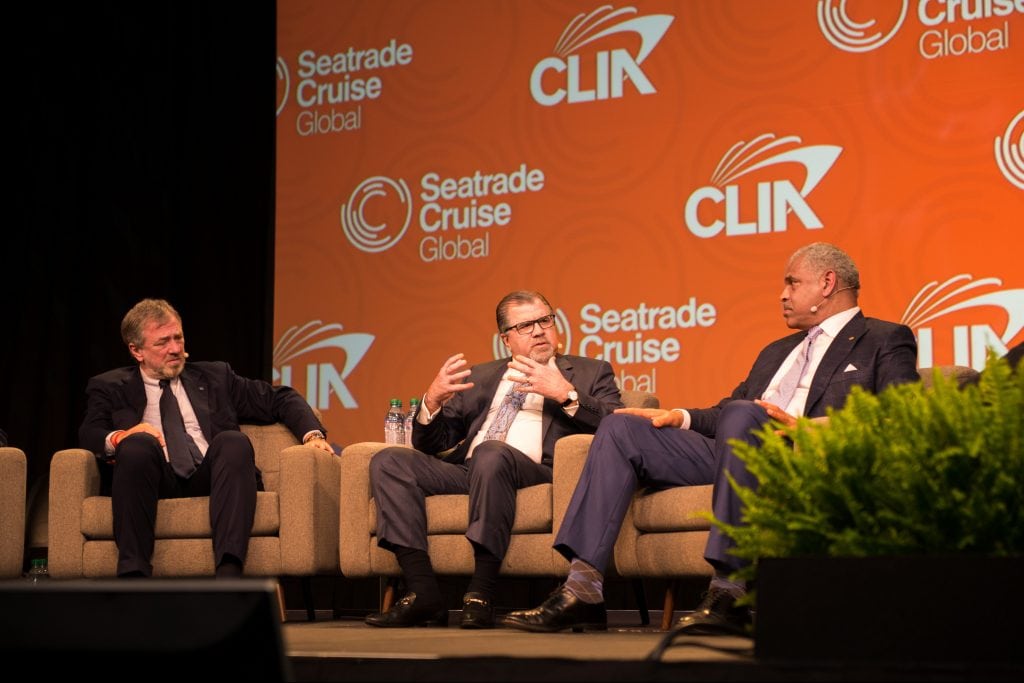Skift Take
As much as cruise lines don't want to take responsibility for contributing to overtourism, there's no denying that they flood destinations with thousands of visitors in a short time. The fact that they are discussing ways to do that more thoughtfully is a good step.
In a year when 27 million people are expected to take a cruise and billions of dollars worth of ships are on order, the CEOs of the world’s largest operators have a new concern: pushback from destinations wary of too many visitors.
During a discussion about the state of the cruise industry at the annual Seatrade Cruise Global conference in Fort Lauderdale Tuesday, executives tackled the question of overtourism — while being quick to point out that they don’t consider themselves offenders.
Arnold Donald, CEO of cruise giant Carnival Corp., said the industry has to “listen with empathy for the issue of what some people call overtourism, not necessarily driven by cruise companies.”
“But,” he added, “the fact [is] that we’re a very visible symbol for it.”
Destinations including Venice and Dubrovnik, Croatia, have been struggling with an influx of visitors, and while cruise ships are just one way those tourists arrive, they have become targets of ire and regulation efforts. Italy, for example, has said big cruise ships can no longer venture into the center of Venice, though the change will not go into effect for several years.
Donald said cruise lines need to work with destinations to make sure there is proper infrastructure in place to accommodate ships and guests and to ensure passengers know the rules and cultures of places they visit.
“In the end, our guests don’t want to go to a place that’s overcrowded,” Donald said. “If the sites that everybody wants to see are being abused, our guests won’t go. It’s in our self-interest, but it’s also in the interest of the places we go.”
Moderator Peter Greenberg, the travel editor for CBS News, had his own example: “I’ve been in the port in St. Thomas where I didn’t want to get off the ship because there were seven other ships there.”
Executives bristled at the notion that they were part of any overcrowding problem, but acknowledged they had a role to play in managing the flow of passengers from ship to shore.
Pierfrancesco Vago, executive chairman of MSC Cruises, pointed to a United Nations World Tourism Organization projection that there could be 1.8 billion global travelers by 2030. Cruises, of course, are responsible for just a fraction of that number.
But Vago said cruise companies can work with governments and coordinate with each other to lessen impact, as he and others including Carnival did in Dubrovnik.
“It’s about infrastructure, it’s about dispersing the guests,” Donald said. “We’re not the issue, [but] whether we’re the issue or not is not the point. We need to help.”
Richard Fain, CEO of Royal Caribbean Cruises, argued that sheer numbers aren’t the issue, it’s the way those numbers are handled. Several of his company’s ships carry more than 5,400 passengers at double occupancy, and Fain said there are ways to improve on the way visitors spend time in port.
“We want them to leave with memories and undersanding and knowledge,” he said. “We want to do a better job of explaining what they’re seeing, we want to do a better job of spreading them out to make sure that they’re not all coming at the same time, at the same hour in the same place.”
Frank Del Rio, president and CEO of Norwegian Cruise Line Holdings, said some tweaks may “perhaps” need to be made. But he said destinations are still eager to do business.
“We’re good partners,” he said. “There are more ports inviting us to go there than there are ports discouraging us from going there.”
Before the CEO panel, Cruise Lines International Association President and CEO Cindy D’Aoust said the entire industry needed to focus on the question of “addressing the challenges of surging global travel” as cruise lines add more and bigger ships.
“We must all pull in the same direction,” she said. “We must define a set of industry-wide commitments to environmental and destination sustainability.”
The Daily Newsletter
Our daily coverage of the global travel industry. Written by editors and analysts from across Skift’s brands.
Have a confidential tip for Skift? Get in touch
Tags: carnival, norwegian cruise line holdings, royal caribbean
Photo credit: Cruise executives discussed the state of the industry, including overtourism concerns, at the Seatrade Cruise Global conference Tuesday. Pictured from left are Pierfrancesco Vago of MSC Cruises, Frank Del Rio of Norwegian Cruise Line Holdings, and Arnold Donald of Carnival Corp. Seatrade Cruise Global
